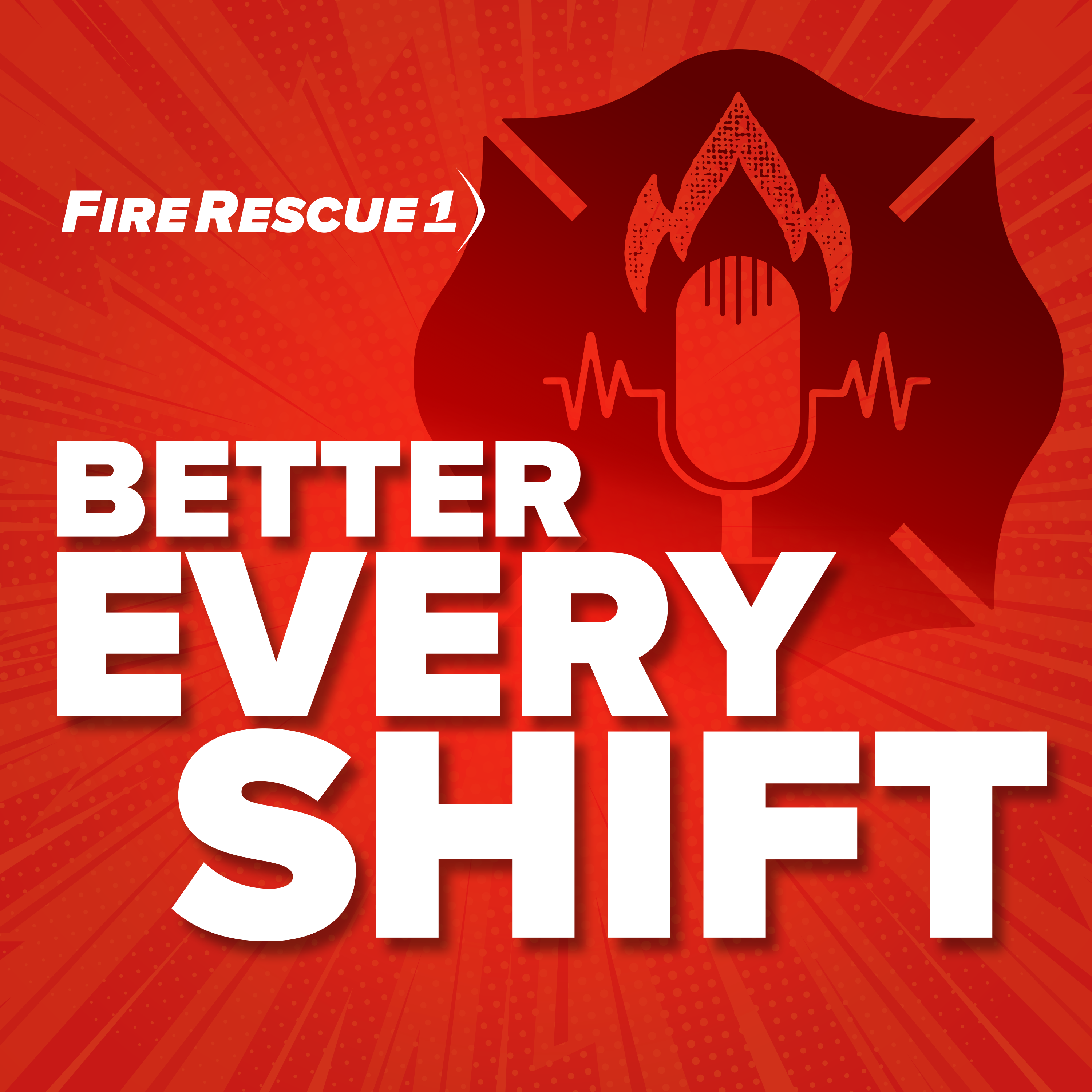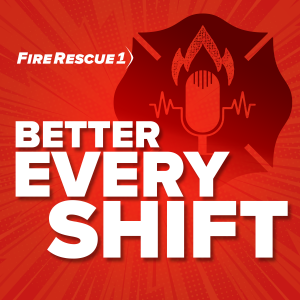
FireRescue1’s Better Every Shift Podcast spotlights the passion and perseverance of firefighters. Hosted by Madison, Wisconsin, Firefighter Aaron Zamzow, the show brings kitchen table conversations to the airwaves, always focused on solutions, positivity and the realities of station life. Zamzow and guests tackle myriad hot topics, whether fire service, news or even pop culture-focused, bringing some levity to the often very serious nature of the profession. Dig into what drives firefighters to improve themselves, their crew, even the fire service as a whole. Listen in to get better every day, every call, every shift.
Episodes

2 hours ago
2 hours ago
The fire chief job is quite simply not what it used to be — it’s a lot MORE. Assistant Chief (ret.) Jo-Ann Lorber details how the fire chief role has expanded over the years, plus the impact of technology, heightened expectations of accountability and transparency, and how to square these new responsibilities amid a culture focused more and more on life-work balance. Lorber underscores the power of delegation and empowering other chief officers to step up and expand their own leadership abilities.
BONUS: Download a checklist based on Lorber’s fire chief’s playbook.
This episode of the Better Every Shift Podcast is sponsored by TheFireStore. Learn more about getting the gear you need at prices you can afford by visiting TheFireStore. This holiday season, listeners receive 10% off now through Dec. 31 with promo code FRP10. Visit TheFireStore.com for Everything but the Truck.
Enjoying the show? Email bettereveryshift@firerescue1.com to share your feedback.

7 days ago
7 days ago
Bill Carey’s recent article “Everyone goes home — except some recruits and applicants” sparked a lot of conversation about fatalities that occur during agility tests and academy drills, and the need for tougher medical screening, heat-stress limits and on-site EMS. The former lieutenant breaks down what the data tells us about firefighter training deaths, plus the “muddiness” of LODD classifications. Carey, who also serves as associate editor for FireRescue1, shares a peek behind the curtain of news posting and reporting and encourages you to share news tips and article ideas.
This episode of the Better Every Shift Podcast is sponsored by TheFireStore. Learn more about getting the gear you need at prices you can afford by visiting TheFireStore. This holiday season, listeners receive 10% off now through Dec. 31 with promo code FRP10. Visit TheFireStore.com for Everything but the Truck.
Email bettereveryshift@firerescue1.com to share your feedback.

Thursday Nov 20, 2025
‘Lead yourself first to lead others better’: Chief Randy Bruegman returns
Thursday Nov 20, 2025
Thursday Nov 20, 2025
Chief Randy Bruegman returns to Better Every Shift to discuss the vacuum of good leaders in the fire service and the many ways leaders (and aspiring leaders) can elevate their leadership game. Zam and the Bruegman tackle marketing mindsets, common traits of strong leaders, plus all this:
- Managing fast-paced change
- Strategic visioning
- “4 minutes to excellence”
- The Leadership Crucible Foundation
- The Glatfelter Scholarship Foundation
This episode of the Better Every Shift Podcast is sponsored by MagneGrip. Eliminate diesel exhaust fumes from inside the fire station with a MagneGrip exhaust removal system. Learn more at MagneGrip.com.
Email bettereveryshift@firerescue1.com to share your feedback.

Thursday Nov 13, 2025
Chad Crouse talks AI: We can’t ‘outsource all the thinking’
Thursday Nov 13, 2025
Thursday Nov 13, 2025
AI can be an incredible tool, but as Division Chief Chad Crouse explains, we can’t use it to “outsource all the thinking.” There are critical parts of the job that require your personal development and review. Chief Crouse breaks down not only when and where to use tools like ChatGPT but also how to maximize their output so you have more time for more important tasks or key parts of the job — like training and connecting with your members. Zam and Crouse cover all this and more:
- AI sycophancy (or as Zam calls it, “AI brown-nosing”)
- Why AI works so well for small departments
- When AI is “cheating”
BONUS: Chief Crouse will speak on AI fundamentals at the IAFC’s Technology Summit International, Dec. 9-11 in Irving, Texas. Learn more and register today.
This episode of the Better Every Shift Podcast is sponsored by TheFireStore. Learn more about getting the gear you need at prices you can afford by visiting TheFireStore.
Enjoying the show? Email bettereveryshift@firerescue1.com to share your feedback.

Thursday Nov 06, 2025
How to process challenging calls: Dr. Derrick Edwards shares the key step
Thursday Nov 06, 2025
Thursday Nov 06, 2025
If you’ve ever been mentally “stuck,” replaying a particularly challenging call or ruminating on a conversation that angered you, then this is the time to tune in. We’re revisiting a powerful episode with Dr. Derrick Edwards, a 20-year fire service veteran who also serves as a professional counselor, digging into several psychological concepts that impact firefighter work and home life. Edwards — aka “Father ’Stache” — also shares how he became a fire service chaplain and why chaplaincy is so similar to counseling.
This episode of the Better Every Shift Podcast is sponsored by MagneGrip. Eliminate diesel exhaust fumes from inside the fire station with a MagneGrip exhaust removal system. Learn more at MagneGrip.com.
Enjoying the show? Email bettereveryshift@firerescue1.com to share feedback.

Thursday Oct 30, 2025
Thursday Oct 30, 2025
Why is everyone in Arizona so friendly? It’s a regional thing — an approach to customer service and community care that originated with fire service legends like Chiefs Alan Brunacini and Dennis Compton. And Mesa (Arizona) Fire Chief Mary Cameli is keeping that torch lit with the department’s strong focus on CRR, member health and safety, and mutual/automatic-aid agreements. Chief Cameli joins the show this week to highlight how innovation underpins so much of the work underway in Mesa, and why staying current with new technology and data-driven decision-making is essential to organizational strength.
This episode of the Better Every Shift Podcast is sponsored by TheFireStore. Learn more about getting the gear you need at prices you can afford by visiting TheFireStore.
Email bettereveryshift@firerescue1.com to share your feedback.

Thursday Oct 23, 2025
‘You are in control’: Dr. Nicole Sawyer on how mindset drives health
Thursday Oct 23, 2025
Thursday Oct 23, 2025
Chronic stress is a job hazard. It impacts your ability to function on the fireground, which is also one of the factors causing your stress in the first place. It’s a cycle filled with physiological and psychological triggers that sometimes feel impossible to overcome. Dr. Nicole Sawyer — a licensed clinical psychologist and public safety mental health consultant — joins the podcast this week to break down what’s happening physiologically when that fight-or-flight stress response kicks in, plus how to manage the lower-level chronic stress that can quietly become a baseline experience.
Read next: “‘I’m fine’ is the biggest bullsh*t statement”: A call for honesty around behavioral health
This episode of the Better Every Shift Podcast is sponsored by TheFireStore. Learn more about getting the gear you need at prices you can afford by visiting TheFireStore.
Enjoying the show? Email bettereveryshift@firerescue1.com to share feedback or suggest guests for a future episode.

Thursday Oct 16, 2025
‘You just don’t quit’: Chief Jeremy Craft’s lessons for leadership — and rodeo
Thursday Oct 16, 2025
Thursday Oct 16, 2025
There’s an unspoken rule in the rodeo world that to be successful, you need a don’t-quit attitude — it’s important when you’re riding bucking horses and it’s also important when you’re a fire service leader. No matter what the roadblocks, you don’t quit until you get the job done. That’s the philosophy that’s driven Lehi (Utah) Fire Chief Jeremy Craft during his early days at the rodeo and his current mission to elevate firefighter cancer prevention programs. We dig into this and much more: His personal cancer experience, his recent honor as the IAFC’s Career Fire Chief of the Year, what’s next for the Western Fire Chiefs Association, and the power of relationships: “You can never know enough people, and you can never have enough friends, especially if you’re in leadership,” he says. Tune in to hear more from Chief Craft.
This episode of the Better Every Shift Podcast is sponsored by MagneGrip. Eliminate diesel exhaust fumes from inside the fire station with a MagneGrip exhaust removal system. Learn more at MagneGrip.com.
Enjoying the show? Email bettereveryshift@firerescue1.com to share feedback or suggest a guest for an upcoming show!

Thursday Oct 09, 2025
‘This game of trade-offs’: Jeff Stull talks NFPA standards
Thursday Oct 09, 2025
Thursday Oct 09, 2025
NFPA standards can be lengthy and hard to follow; fortunately, we’ve got Jeff Stull here to break down what you need to know, particularly as it relates to the newest big development — the consolidation of key PPE and SCBA standards into NFPA 1850. Stull shares insights into the standards-development process and why it’s always a “game of trade-offs” — gear that provides the best protection while still allowing you to get the job done.
Check out these additional resources:
- The Standards Series
- Stull’s FireRescue1 column: PPE update
- Webinar: Navigating the NFPA 1851 and 1852 merger into NFPA 1850
This episode of the Better Every Shift podcast is sponsored by MSA, the world’s leading manufacturer of high quality, fire-rescue and safety solutions, protecting first responders around the world since 1914. For more information, visit MSAfire.com.
Enjoying the show? Please take a moment to rate and review us on Apple Podcasts. You can also follow the show on Apple Podcasts, Spotify or wherever you listen to your podcasts. And email bettereveryshift@firerescue1.com to share your feedback.

Thursday Oct 02, 2025
Biohack your health: Mike Binney talks fatigue management
Thursday Oct 02, 2025
Thursday Oct 02, 2025
Assistant Chief Mike Binney is here to help you biohack your health. If you don’t know what that means, don’t worry, Binney breaks it all down — what the latest research shows about sleep habits and fatigue management, plus the work underway to understand the impact of changing traditional shift schedules. Binney also speaks to the role of mobile integrated health and community risk reduction programs in the larger effort to reduce firefighter fatigue, because, as he underscores, “You don't get burned out from running fires and doing awesome stuff. You get burned out from seeing the same person three times in two days.”
Plus, consider participating in the research study Binney discusses: Shift Scheduling and Sleep Health in Firefighters & Firefighter Investigative Research on Essential Zzz (FIREZzz)
This episode of the Better Every Shift Podcast is sponsored by MagneGrip. Eliminate diesel exhaust fumes from inside the fire station with a MagneGrip exhaust removal system. Learn more at MagneGrip.com.
Enjoying the show? Email bettereveryshift@firerescue1.com to share your feedback or suggest guests for an upcoming episode.
